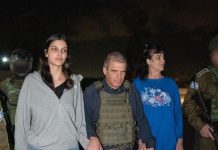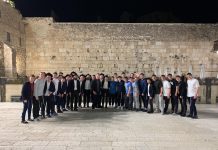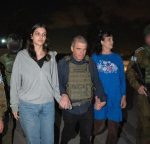Our Aliyah Chronicle
By Shmuel Katz
Jewish schools the world over spend significant amounts of time and money trying to instill “Israel advocacy” in their students. When their students go out into the world, they want them to be prepared for the vigorous and often vitriolic debate on issues regarding Israel that they will encounter in public–on
campus, at work, essentially wherever they go, even online. In Israel, this is called hasbarah.
Hasbarah is often taught in high schools or, more frequently, in universities. It is not an easy thing to teach or to learn. Perhaps one of the hardest skills to acquire is the willingness to speak up and stand tall for what you believe in. Most people prefer not to get involved, or they don’t want to bother speaking up when they don’t think it will make a difference. They’ll go to a demonstration or parade, but not much else.
Our son Mordechai is in the 9th grade. He is one of the most “Israeli” of our children. He prefers to communicate in Hebrew, both conversationally and in writing (his spelling in English is atrocious). In fact, on a recent belated bar mitzvah trip to Florida with my parents, he turned to his grandmother and said, “Bubby, it’s really hard for me to read and understand this menu in English; what do they serve here?”
Like many other teens here, Mordechai is already beginning to think about his army service. As I wrote last week, evaluations begin at age 16 and they are quite rigorous, especially for specific combat units. With the goal of getting into a specific division, Mordechai has begun to focus on his physical fitness to make sure that he is up to the challenge when he begins the evaluation process. This, of course, is in addition to the normal fixation many teens have on building up their bodies, strength, and stamina.
Mordechai decided to use the workout facilities at Sha’alvim. We had to sign a permission slip and he needed medical clearance, but for a small fee, he has full use of all their equipment at specific times. And he has been using it as often as he can.
As part of his focus on his workouts, Mordechai was doing research online and came across a picture of someone of Arab descent, posing in Palestinian colors, with their flag displayed, and making anti-Israel comments in one of the groups he was participating in. It rankled him.
Katzes are not known for keeping their opinions to themselves, especially when we are right (which is, of course, always). And so Mordechai, despite the fact that it took him an hour to compose his thoughts in English, posted a comment, challenging the person on the historical “facts” regarding the history of the “country” of “Palestine.” Yes, it was full of misspellings and incorrect grammar. But he wrote it.
And he got a response. This response turned into a short discussion between him and that person, though neither was able to change the other’s mind. Yet, in the end, Mordechai did get a response that perhaps there is more for this person to think about. At the end of the day, that’s about as much as we can hope for.
But the point isn’t Mordechai’s opinion or the other guy’s opinion. The achievement here is that many other people in that group will see the discussion. And there may be someone who might not have a firmly formed opinion, whose eyes might be opened a little by Mordechai’s challenge. Someone who takes a second to do some research because he can’t quite believe that there really was never a country called Palestine. That is what hasbarah is all about.
I think we all need to take this to heart. How many times have we seen or heard a remark about Israel that is offensive, or simply false, and just ignored it, assuming there was no point engaging with fanatics? The truth is that you can’t sway fanatics. But you can do good work swaying those who are trying to figure out where they stand. And we need help with this, because Israel has a lot more enemies than friends out there.
I mentioned Mordechai’s experience to a friend of mine, knowing that this friend would be impressed with him. And sure enough, he said to me, in Hebrew, “Your son is an online soldier for the state of Israel.” That should make us all proud. I know I am.
Shmuel Katz is the executive director of Yeshivat Migdal HaTorah (www.migdalhatorah.org), a new gap-year yeshiva. Shmuel, his wife Goldie, and their six children made aliyah in July of 2006. Before making aliyah, he was the executive director of the Yeshiva of South Shore in Hewlett. You can contact him at shmu@migdalhatorah.org.















